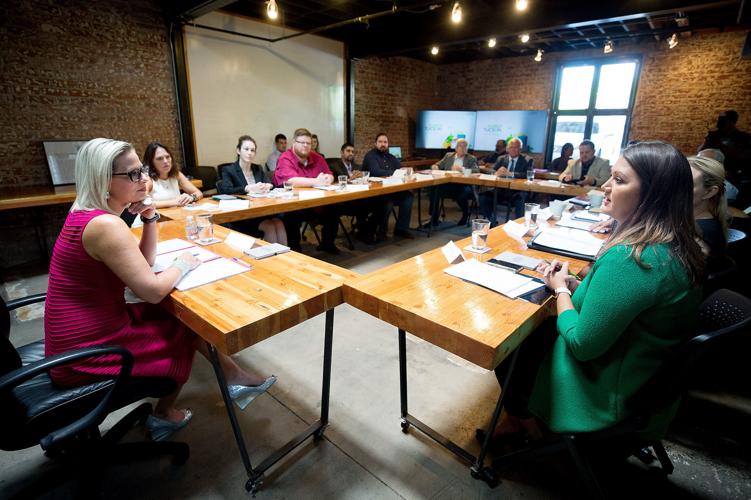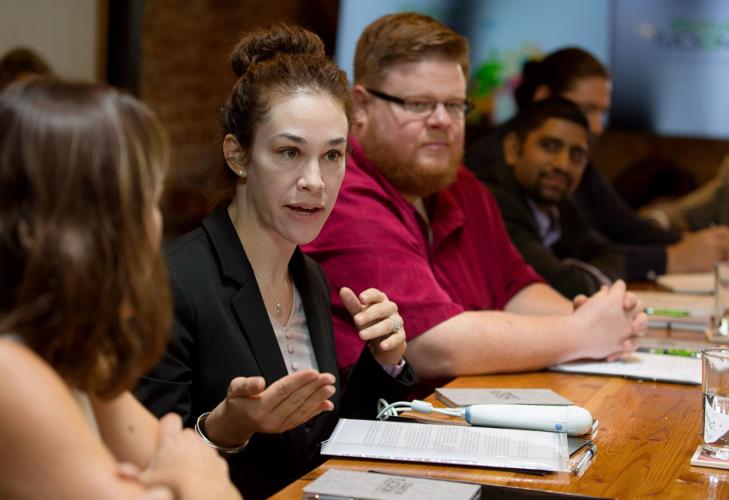U.S. Sen. Kyrsten Sinema says she will continue to push to resolve issues important to Arizona startup businesses during her first term in the high chamber, including blocking a federal sales tax on medical devices.
At a roundtable discussion Thursday in Tucson marking Congressional Startup Day, the Phoenix-area Democrat said the medical-device excise tax enacted as part of the Affordable Care Act in 2012 is particularly harmful to Arizona because of the state’s large device industry.
The medical-device sector is seen as a major strength of Arizona’s biosciences industry, with major employers including Roche Tissue Diagnostics in Oro Valley, Medtronic in Tempe, W.L. Gore & Associates in Flagstaff, and a bevy of device startups.
Sinema said in an interview after her appearance at the Tucson Metro Chamber that she believes there is bipartisan agreement to continue a moratorium on the 2.3% tax, which has been suspended by Congress since 2016.
A two-year moratorium on the tax enacted in 2018 will end at the end of this year unless Congress acts.
Sinema said if the moratorium is not extended, “it would have an immediate negative impact on businesses in Arizona.”
“We have a very robust medical device industry in Arizona, as far north as Flagstaff with W.L. Gore, down to the startups we’ve seen here in Tucson,” she said.
Sinema said repeal is a tougher task than extending the moratorium, adding that she is lead Democrat on a bill to repeal the tax along with an annual tax on health insurers.
“I think delay is most likely, but we are continuing to work on a strategy for repeal,” she said.
The senator, who is Senate co-chair of Congressional Startup Day, also highlighted legislation she’s working on to help startup businesses, including:
- A bill to cut red tape by extending the period after which startups must provide third-party financial audits, to 10 years from five.
- Legislation to allow companies to pitch their ideas to individual, angel investors in so-called “demo days” before filing detailed financial information.
- A measure to encourage investment in rural broadband infrastructure.
- A bill requiring the U.S. Small Business Administration to take a deeper look at companies that don’t initially qualify for SBA benefits and services.
During the event at the chamber’s new downtown office, Sinema heard updates on Startup Tucson and its recent partnership with the chamber, on the University of Arizona’s nascent Forge incubator, and heard presentations by several local startup business founders.
Two presentations in particular caught Sinema’s interest.
Brian Ellerman, leader of the UA Forge and a longtime tech investor and entrepreneur, said the soon-to-open incubator will initially focus on companies in the areas of sustainability and digital health care.
Sinema said she is keenly interested in advancing digital health services such as video-conferenced doctor visits, particularly for veterans and for rural areas like Arizona’s tribal lands that lack access to health care.
“This is a big priority for me, to get health-care access to veterans,” Sinema said.
The senator also was keenly interested in a presentation by Courtney Williams, founder of medical-device startup Emagine Technology Solutions.
Williams showed off her company’s technology that turns a mobile phone or tablet into a low-cost, portable ultrasound scanner, which could extend ultrasound screening to areas lacking such equipment.
Other Tucson startup founders making presentations during the roundtable were:
- Shiva Planjery of Codelucida, which has developed new error-correction software to speed data applications;
- Harry George of Radiance Therapeutics, which has a new radiation treatment to prevent complications from a common surgical treatment for glaucoma;
- Mike Sember and Rajesh Khanna of Regulonix, which is developing a new class of non-opioid pain relievers;
- And Emil Tremblay of SGNT, which is marketing an electronically tagged “magic medicine bottle” to assure the authenticity of prescription medicine.





